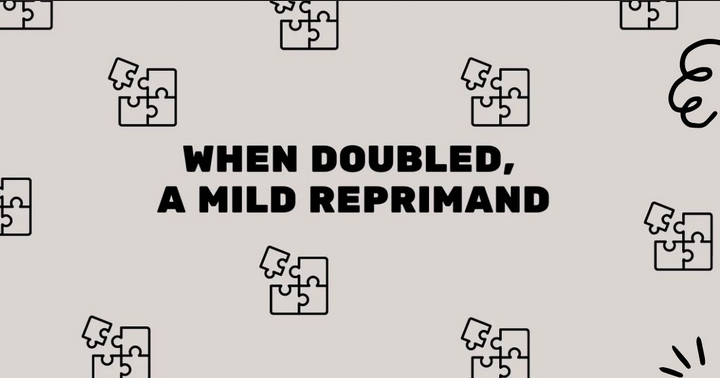Discipline is a word that often evokes mixed feelings. On one hand, it’s crucial for shaping behavior and instilling values in both children and adults. On the other hand, the traditional methods of discipline can sometimes feel harsh or overly punitive. So, what if there was a way to strike a balance? What if “when doubled a mild reprimand” could be the key to effective discipline?
Imagine cultivating an environment where accountability meets understanding—a space where lessons are learned without fear. This guide will explore how doubling down on gentle corrections can pave the way for more meaningful interactions and lasting change. Join us as we delve into innovative approaches to discipline that prioritize respect while still holding individuals accountable for their actions.
Understanding the Importance of Discipline
Discipline is more than just enforcing rules; it’s about guiding behavior and fostering growth. It lays the foundation for responsibility, helping individuals understand the impact of their actions on themselves and others.
When we practice discipline effectively, we create a framework within which people can thrive. This structure promotes self-control and decision-making skills that are vital in various aspects of life.
Moreover, discipline nurtures respect—both for oneself and for authority figures. It encourages open communication about expectations and consequences, which builds trust between parents, teachers, or leaders and those they guide.
In essence, effective discipline serves as a roadmap to personal development. It teaches important life lessons while paving the way for healthy relationships grounded in mutual understanding. By recognizing its importance, we can approach discipline with intention rather than reaction.
The Consequences of Ineffective Discipline
Ineffective discipline can lead to a cascade of negative outcomes. When boundaries are unclear, individuals often feel lost. This confusion breeds frustration and resentment.
Without consistent guidance, behavior may spiral out of control. Misunderstandings grow, making it hard for anyone involved to trust the process. Instead of learning from mistakes, individuals might repeat them.
Additionally, ineffective methods can damage relationships. Communication breaks down when reprimands lack clarity or fairness. The very act meant to guide becomes a source of conflict.
In environments like schools or workplaces, morale tends to suffer as well. A culture of fear is created rather than one focused on growth and improvement.
When discipline fails to resonate positively, disengagement follows suit. People either rebel against authority or simply check out emotionally—both detrimental paths that hinder development.
Why Mild Reprimands May Be More Effective
Mild reprimands can often be more effective than harsh punishments. They create an environment where individuals feel safe to learn from their mistakes.
When doubled a mild reprimand is issued, it minimizes feelings of resentment. This encourages open dialogue rather than defensive reactions. People are more likely to reflect on their actions without the fear of severe consequences hanging over them.
Additionally, mild reprimands maintain respect within relationships. When discipline comes across as fair and reasonable, it fosters trust between parties involved. This trust can lead to better communication in the future.
Moreover, the psychological impact of a gentle correction is significant. It allows for personal growth while still addressing undesirable behavior effectively. Instead of shutting down conversation or motivation, mild reprimands pave the way for constructive feedback and improvement.
Approaches to Doubling a Mild Reprimand
When doubled a mild reprimand requires a thoughtful approach. Start by acknowledging the behavior that needs correction. Be specific about what was inappropriate and why it matters.
Next, introduce an element of reflection. Encourage the individual to consider how their actions impact others. This promotes accountability and fosters personal growth.
Then, apply gentle reinforcement for positive behaviors alongside the reprimand. Highlight moments when they acted appropriately, creating a balanced perspective on their conduct.
Consider using role-playing as an alternative method to express concerns creatively. It allows individuals to see situations from different angles while maintaining engagement.
Maintain open communication throughout this process. A dialogue ensures misunderstandings are cleared up and establishes trust in your intentions for improvement.
Case Studies and Examples
Consider a school that implemented a system of when doubled a mild reprimand for disruptive behavior. Instead of harsh punishments, teachers opted to address issues with gentle reminders and constructive feedback. Over time, students responded positively, leading to a more respectful classroom environment.
In another instance, a workplace adopted similar strategies for managing employee performance. Supervisors used mild reprimands during one-on-one meetings rather than formal write-ups. This approach encouraged open communication and allowed employees to feel supported rather than attacked.
Parents can also benefit from this method at home. A family chose to use soft verbal corrections when their child misbehaved instead of resorting to yelling or severe consequences. The child became more receptive and began self-correcting behaviors without feeling intimidated.
These case studies illustrate the potential success of doubling down on mild reprimands across various settings while fostering growth and understanding.
The Role of Consistency in Disciplining
Consistency is the backbone of effective discipline. Without it, even the best intentions can fall flat. When rules and consequences fluctuate, confusion sets in.
Children thrive on predictability. A consistent approach helps them understand expectations and limits. This clarity fosters a sense of security, allowing them to navigate their world more confidently.
When reprimands are doubled or varied without reason, they can lead to frustration. Kids might question why one behavior merits a certain response today but not tomorrow. This inconsistency creates an unstable environment that undermines trust.
By applying the same principles consistently over time, caregivers reinforce desired behaviors effectively. It’s about teaching lessons rather than instilling fear—an essential distinction for fostering healthy relationships between adults and children alike.
Consistency drives home important messages about behavior while promoting respect from both parties involved in the disciplinary process.
Conclusion
Discipline is a crucial part of fostering growth and development. Understanding when to double a mild reprimand can be the key to effective behavior management. The consequences of ineffective discipline can create an environment where behaviors escalate, potentially leading to more severe issues down the line.
Exploring why mild reprimands may resonate better with individuals opens up pathways for communication and understanding. By employing various approaches to doubling these gentle corrections, you reinforce expectations without causing resentment or fear.
Case studies illustrate that consistent application of this technique does yield positive results over time. It cultivates trust and respect between authority figures and those they guide. Consistency in your disciplinary approach helps shape desired behaviors while minimizing confusion.
Effective discipline isn’t just about correcting wrongs; it’s also about nurturing relationships built on mutual respect. You can create an atmosphere conducive to learning and personal growth by implementing thoughtful strategies around mild reprimands.


